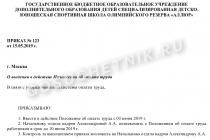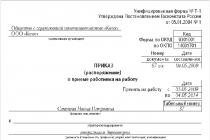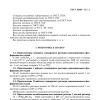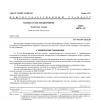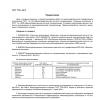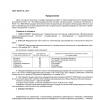Can a quarrel between ex-spouses undermine business reputation legal entity? Especially when rubbish from the hut is taken out into the public plane: social networks, media, etc.? And in general, can any negative information about a director, or a person who is a member of the management bodies of a legal entity, about a simple employee, negatively affect business reputation legal entity? And does the organization have the right to "defend" its reputation in court? Let's try to figure it out.
Is the reputation of the director tarnished – is the reputation of the organization also tarnished?
It would seem that the head of the organization is an independent person and can hardly be related to the business reputation of the legal entity he manages. But let's imagine our reaction, for example, in the following situation: we decide to order construction works LLC "Chamomile and cornflowers" And suddenly we find out that their director is a swindler, a thief and just a dishonorable person or is involved in a muddy story with embezzlement of budget funds. Will this information affect our decision to enter into a contract with the organization itself? I think so, at least we will think about the expediency of cooperation, and the chances that we will turn to another organization will increase dramatically. That is, as we can see, rumors about the director also affect the activities of the organization itself.
Such a relationship between the reputation of the leader and the organization was pointed out at the time by the Supreme Court Russian Federation: the head, as the sole executive body, acts in civil circulation on behalf of the legal entity, which means that his reputation is inevitably associated with the reputation of the legal entity, affects the assessment by the company of the activities of both the legal entity and the director himself (, A56-17708 / 2014). The business reputation of a director and a legal entity are interconnected. They said badly about the legal entity - the reputation of both the director and the organization "fell". And vice versa - bad news about the director will also affect the legal entity.
And this applies not only to the director, but also to other employees of the organization (just a "blow" on the leader is much more "painful"). In particular, this is stated in (approved by the Presidium of the Supreme Court of the Russian Federation on March 16, 2016, hereinafter referred to as the Review): damage to the business reputation of an organization can be caused by the dissemination of discrediting information both about the organization itself and in relation to persons included in its management bodies and employees of this organization.
Softly laid - will you have to sleep softly?
In this scenario, it becomes clear that a law firm has filed a lawsuit against citizen M., who wrote in her blog that CEO society, her former common-law husband, stole a common child. The society considered that the business reputation of the company was thus damaged, since M. directly mentioned the name of the LLC and the status of "ex-husband" in it. In this connection, they demanded to oblige M. to remove the post from the blog with a refutation of the information, and also to recover from her compensation for non-material (reputational) damage in the amount of 600 thousand rubles. The case reached the AS of the North-Western District. ().
However, the society lost: the court refused to meet the requirements. In his opinion, the information from the blog does not contain allegations of a violation by the plaintiff of the current legislation, bad faith in the implementation entrepreneurial activity, violation business ethics or business practices that belittle or discredit his business reputation. What has been said about the director of the company does not apply to the plaintiff, this is a “personal” matter of the director and M.
M. disseminated information about the allegedly wrong, unethical behavior of the director in his personal and family life. And the fact that at the same time M. mentioned the name of the society itself does not change the situation. It was the director who should have filed a claim to protect his reputation, not the organization. Director's personal life business area irrelevant, according to the court.
But what about the above position of the RF Armed Forces? In the blog, the director is directly accused of unlawful, unethical behavior, the name of the plaintiff company is mentioned. Maybe the fact is that the decision on the case was made on the basis of the position of the RF Armed Forces in the Review? No, the courts have previously taken an exemplary position, the fact is that the court was guided by other motives, and in order to understand the "reaction" of the court, it is better to turn to a different judicial act ().
An article was published in one of the newspapers, which talked about allegedly dishonest behavior in the division of the inheritance of persons who were members of the management bodies of the joint-stock company. The company filed a lawsuit for the protection of business reputation, but the court dismissed the claim, since information about the actions of persons holding certain positions in the management bodies of a legal entity can be regarded as discrediting the legal entity itself only if the publication creates the impression of one-pointed interests a legal entity and its management, or when there is no semantic separation and opposition of the interests of a legal entity and real individuals. Otherwise, such persons (managers) may apply to the court for the protection of their reputation as individuals.
That is, not every "damaging" information about a manager, employee, etc. "affect" the business reputation of a legal entity, but only that which is associated with the business qualities of the manager (employee), his business (professional) activities in conjunction with the activities of the organization.
So, for example, the court satisfied the claim of the company for the protection of business reputation against the administrator of a domain name on the Internet: publications appeared on the site that the director of the company was allegedly involved in unscrupulous "scams" with real estate on the verge of a raider seizure, and also "chemists" with labor rights employees, draws up with them labor Relations to a shell company. At the same time, the court rejected the defendant’s argument that no negative information was disseminated in relation to the company itself, since the director’s reputation as a sole proprietor executive body inevitably associated with the reputation of the society itself and directly affects the assessment of the behavior of the organization that has developed in society ().
As you can see, the information directly related to the way the leader does business. Information about other areas of the life of an employee or head of a legal entity does not concern. I note that before the position expressed by the RF Armed Forces in 2015, the courts sometimes refused to file a lawsuit against legal entities even when the information concerned business activity leader in his post, believing that the leaders "themselves with a mustache" and can stand up for themselves as individuals ().
Of course, after such examples, the question naturally arises: is it really possible to throw mud at a leader, simply avoiding his business qualities, and nothing can be done about it? It is possible, but you will have to "hurry up" the leader himself and go to court with a lawsuit as an individual. The organization, however, can assist him in this (the same legal department prepare a claim, help build a line of defense). There are also "joint" claims of the head (or other person) and the legal entity () in practice.
In the case mentioned above, considered by the Seventeenth Court of Appeal, there is another interesting point: a claim was brought against the administrator of a domain name on the network, since the information was posted on the site, and there was no information about the person who disseminated the defamatory information, as well as information about ownership site to any media outlet that is a legal entity, or about the founders of the media outlet. Thus, a person is protected from deleting information that discredits his reputation or simply does not correspond to reality.
Today, the web is full of sites with reviews about employers, or about organizations, on which employees or clients can leave their opinion about a particular organization. And these opinions do not always correspond to reality, they are written with the intent to discredit the reputation of a legal entity as a whole or a specific leader (employee). In this case, the organization has the right to demand the removal of information from persons up to the domain administrator. First, you can contact the site administration directly with a request to remove the information, and if it is refused or ignored, you can go to court.
If the defamatory information posted on the site on the Internet is recognized by the court as untrue, the owner of the site or another person authorized by him who posts information on this site is obliged to delete such information at the request of the victim, and in case of refusal to delete the information on a voluntary basis , By the tribunal's decision. As a rule, the requirements for saving time when applying to the court are combined.
Compensation for reputational damage - a guardian and a club against violators?
If everything is more or less clear with the link “reputation of the manager - reputation of the legal entity”, then one more question remains - is it possible to recover compensation from the guilty person, primarily non-material (reputational)?
Let me remind you that with the reform of civil law, changes were made: if earlier compensation for moral damage could be collected in favor of a legal entity, now it prohibits this. Trying to circumvent the ban, legal entities began to file claims for compensation for reputational damage.
The courts split into two camps. Some interpret the law literally - "what is not directly provided for by law is prohibited," which means no compensation for reputational damage. At one time, the AC of the North Caucasian District (,) acted as an active conductor of this approach. Other courts also supported him (for example,).
Interestingly, the Supreme Court of the Russian Federation equally rejected cassation appeals against judicial acts, both of the first and second positions. Until, finally, he himself expressed himself more or less clearly in:
It turns out that simply "intimidating" the offender with millions of claims will not work, although today the courts significantly reduce the amount of compensation sought compared to that indicated in the statement of claim. Usually, on average, the plaintiffs ask to recover from the defendants amounts from 100 thousand to 4-6 million rubles. The average amount awarded fluctuates around 50-300 thousand rubles.
So, for example, in one of the above examples (), the plaintiff asked to recover compensation for reputational damage in the amount of 6 million rubles, while the court awarded 300 thousand from the defendants in favor of each plaintiff (given that there were two plaintiffs, it turned out to be 600 thousand damages from each defendant, of which there were three, i.e. in total - 1.8 million rubles).
In another case, when the plaintiff requested 1 million rubles in compensation, the court recovered 200 thousand rubles. ().
And now some conclusions...
If you think that the dissemination of information about an employee, manager, member of the management body has harmed the business reputation of the organization, then get ready to prove that the information concerned specifically the professional (business) activities of the manager, or may be interpreted by consumers (counterparties, etc.) as related with the organization itself. Pay attention to how the publication mentions the position of the person, his business qualities, manner of leading, etc. It may also be necessary to appoint a linguistic expertise. However, the chances of success depend on the content of the disseminated information and the court's interpretation of it.
Recovery of compensation for reputational damage is possible. To do this, it will be necessary to prove: the discrediting nature of the information, the presence of a business reputation, the damage caused to the reputation and the causal relationship between the "fall" of the reputation and the dissemination of discrediting information.
The presence of a reputation will help to prove: a wide client base, customer and counterparty reviews, publications about the organization, the presence of registered trademarks, participation in competitions, exhibitions, etc. That is, evidence that a wide range of people knows about the organization, and this knowledge is of a certain nature.
But it will be more difficult to prove the "diminution" of reputation due to the non-specific nature of the evidence base. Typically, the following can be investigated: customer exit, the sending of letters of refusal by counterparties and customers to cooperate, a decrease in sales, the dismissal of employees, etc. However, all of the above may not be related to the "fall" of reputation at all. We will have to provide evidence that, in general, the socio-economic situation in the industry, the region is favorable, there are no problems with the quality of work (production), that is, that the reason lies not in the activities of the organization itself, but is precisely the result of the spread of discrediting information. The reference to the dismissal of personnel will be especially unconvincing, although the author is aware of cases when key employees were dismissed from the organization due to fears that their name would be tarnished by cooperation with an organization with a "tarnished" reputation. Usually, we are talking about "narrow" industries where everyone knows each other. At the same time, such employees did not hide their motive for dismissal. But it will be possible to prove in court if the employee himself confirms his motive (for example, in a letter of resignation, testimony in court, etc.).
In the current Civil Code there are three references to the right of legal entities to the protection of business reputation. The first is found in Art. 152, the second refers to the commercial concession agreement (Article 1027), the third is indicated in Art. 1042 and refers to a simple partnership. Next, let's look at how protection of honor and business reputation of legal entities.
General information
Based on the norms indicated above, it is possible to determine the key signs of goodwill.
First of all, it is. Secondly, reputation is endowed with the sign of transferability. Thirdly, the protection of the business reputation of individuals and legal entities is carried out in identical ways.
In addition, she is endowed with a sign of alienation. However, it only appears in business. Alienation of reputation occurs when a transaction is made with an enterprise acting as a property complex. The possibility of reputation transfer is determined by the fact that a commercial designation is included in the organization. Also, the alienation of reputation occurs along with the transfer of a trademark.
It is also of particular importance. Its value is the amount of the premium paid by the acquirer in anticipation of future economic profits in connection with the purchased non-identifiable assets.
The Importance of Reputation
Business reputation is one of the essential conditions for the successful operation of a legal entity. Its special significance is enshrined at the legislative level. in different regulations rules are set to ensure protection of the business reputation of a legal entity. Article 3.1 of the Code of Administrative Offenses, for example, contains a prescription that the purpose of an administrative sanction cannot be to damage reputation. In Art. 14 Federal Law No. 135 is prohibited unfair competition. In particular, the dissemination of false, distorted information about business reputation capable of harming the company.
Jurisdiction
Goodwill claims arising from legal relations in the field of business or other economic activity, considering arbitration court. In this case, the subject composition of the dispute does not matter. If the need for protection of honor, dignity and business reputation arose within the framework of other legal relations, then the case is within the jurisdiction of the instance of general jurisdiction. In this case, the subject composition also does not matter.
Grounds for filing a claim
According to article 152 of the Civil Code of the Russian Federation, a legal entity can file an application with the court if there are a combination of three circumstances: there was a fact of dissemination of information about the organization, the information is discrediting and does not correspond to reality.
The Supreme Court in Resolution No. 3 of 2005 reveals the essence of these circumstances.

The concept of "dissemination of information" is interpreted quite broadly. It can be carried out, for example, on radio, TV, in the press, public speeches, messages addressed to one or another officials in written or oral form, on the Internet, etc.
Information that does not correspond to reality is called statements about events / facts that did not take place in reality during the period to which they relate.
Discrediting is, for example, information containing an allegation of non-compliance by the legal entity with the requirements of the law, bad faith in the conduct of economic activity, violation of business ethics, customs of turnover. All this information detracts from the reputation of the organization.
The Supreme Court draws attention to the need to differentiate statements about facts and events, the correspondence of which to reality can be verified, and opinions, value judgments, beliefs that are not the subject of protection in accordance with Article 152 of the Civil Code of the Russian Federation. The latter are an expression of the subjective views of a certain person. They cannot be verified for validity.
Nuances
If information discrediting the organization's reputation was published in the media, the victim may demand their refutation in the same media. If such information is present in a document emanating from the enterprise, then the legal entity has the right to demand the cancellation or replacement of such an act.
Detractors can disseminate information in the media that violates the interests or rights of the organization, but is not vicious at the same time. In such situations, in accordance with paragraph 3 of article 152 of the Civil Code of the Russian Federation, a legal entity may publish its response in the same media.
Losses
As part of protection of the business reputation of a legal entity in judicial practice claims for compensation for damage caused by the dissemination of defamatory information are considered. Losses also include unearned income.
When collecting legal entities often face certain difficulties and in some way with injustice. Difficulties associated with compensation for lost profits. The injustice is expressed in the fact that even if the claims for recovery are satisfied, the indemnified loss will not be able to cover all the losses, since the impact of the defamatory message can be quite long.
If the need for protection of business reputation of a legal entity arose as a result of the dissemination of information in print media, then over time the relevance of this information will decrease. However, on the Internet, the relevant information can be accessed without any restrictions.
Compensation for moral damage
With its help, the issue of injustice can be resolved while meeting the basic requirements for protection of the business reputation of a legal entity. Meanwhile, the organization, being an artificial formation, in fact, cannot experience either physical or moral suffering. Therefore, the company cannot claim compensation for moral damage. This conclusion also confirms arbitrage practice.

However, since 2003, a slightly different trend has been observed. The turning point was the adoption of the Definition of the Constitutional Court No. 508-O of 2003. In it, the possibilities protecting the business reputation of legal individuals have been significantly expanded. In particular, the SC stated that:
- The applicability of a specific method of restoring a violated right must be determined solely in accordance with the nature of the organization.
- Absence in the legislation of a direct reference to a particular instrument protection of the business reputation of a legal entity does not deprive him of the right to file a claim for compensation for losses, including non-material ones that have arisen in connection with the dissemination of defamatory information, or non-material damage that has its own content that differs from the essence of the harm caused to the citizen.
In its ruling, the Constitutional Court referred to the judgment of the ECHR of 2000, in which it indicated that the possibility of satisfying the requirements commercial organization for compensation for moral damages.
Case Studies
It should be noted that the concept of "intangible losses" is not used in domestic legislation. According to the provisions of Article 15 of the Civil Code, losses are always material. At the same time, this concept reflects the features of the harm caused to the commercial structure.
There are many illustrative examples in the jurisprudence on this issue. Thus, the subject of one of the disputes was information discrediting the business reputation of the bank. The courts, including the court of appeal, spoke in favor of recovering non-material (reputational) damage from the infringer. In satisfying the claim, the arbitral tribunal indicated that the damage was expressed in the loss of confidence in financial organization from the clients side. This caused an outflow Money. The court also agreed with the bank's argument that the amount of reduction in the size of the deposit base acts as a measure to diminish its business reputation.
In another dispute, the plaintiff was denied compensation for reputational damage. However, the cassation instance canceled the earlier decisions and sent the case back for a new trial. Court of Appeal pointed out that an organization cannot experience suffering, either physical or moral. The legislation, in turn, does not establish the possibility of compensation for moral damage to legal entities.
This conclusion is opposed by the position of another arbitral tribunal. He pointed out that Article 12 of the Civil Code contains a provision providing for compensation for moral damage, as well as allowing the use of other methods of protection established by federal law.

In the development of this norm in paragraph 5 of Art. 152 of the Civil Code contains an indication of the possibility of a citizen to demand compensation for non-pecuniary damage within the framework of protection of honor, dignity and business reputation. According to paragraph 7 of the same norm, the rules of the article also apply to cases of protecting the reputation of a legal entity. The Arbitration Court also referred to the provisions of Ruling CC No. 508-O. In fact, the instance concluded that there is such a method of protection in the law as compensation for reputational damage, but under a different name - "compensation for moral damage."
conclusions
As can be seen from the above examples, judicial practice on compensation for moral damage is very contradictory. This is due, first of all, to insufficiently clear regulatory regulation.
The fact is that the legislator put the first part of the Civil Code into effect in 1994. At that time, market relations were just beginning to emerge. Developers of normative acts then did not assume that the reputation of legal entities would soon acquire such significance. With the development of market relations, the need arose for a detailed study of issues related to rendering legal services legal entities in protecting their reputation.
Criminal law
Statement on the protection of the business reputation of a legal entity may also be filed in criminal proceedings. This possibility is provided for under Article 42 of the Code of Criminal Procedure. When a crime damages the reputation of an organization, it can be recognized as the injured party. Accordingly, for the defense, the wrongful act and damage must be established.
Crimes that can harm the reputation of a legal entity include:
- Illegal use of means of identification (trademark, in particular).
- Illegal receipt and disclosure of tax, banking, commercial secrets.
controversial points
To ensure the protection of its reputation, a legal entity in criminal proceedings may file a claim for compensation for pecuniary damage if there is reason to believe that it was caused by a crime.
Article 44 of the Code of Criminal Procedure contains a provision providing for the possibility of the victim to file a civil claim for compensation for moral damage. Compensation for such damage, as follows from the above reasoning, can take place within the framework of civil litigation. However, the same conclusion cannot be drawn for criminal trials.

In the event of damage to business reputation, extra-contractual obligations arise related to its compensation. Their regulatory regulation is provided for by the norms of Chapter 59 of the Civil Code.
At the same time, the Code contains Article 1064, which has general character as part of the regulation of obligations related to compensation for harm. This rule states that damage caused to the property of an individual or legal entity must be fully compensated by the entity that caused it. Based on this, it can be concluded that either reputation relates to property, or damage does not entail the emergence of non-contractual legal relations.
Due to the fact that Article 152 is contained in Chapter 8 of the Code, which is called "Intangible benefits and their protection", the assumption that reputation is included in Property Complex legal entity, has no basis. An analysis of the content of Article 42 of the Code of Criminal Procedure leads to a similar conclusion. It states that an organization is also recognized as a victim if its property and reputation were harmed by a crime.
Timing
Due to the fact that the claim to protect the reputation of the organization is aimed at restoring non-property rights, the limitation period, according to Article 208 of the Civil Code, does not apply to it. However, there are exceptions to this rule.
If defamatory information was disseminated in the media, then the legal entity may require the editorial office to publish a refutation. If this is denied to the applicant, then he has the right to apply to the court to challenge the inaction of the violator of rights. In this case, the application can be submitted within one year from the date of dissemination of the relevant information.
Features of the content of the claim
The application is made according to general rules. The claim must indicate:
- The name of the authority authorized to consider such disputes.
- Information about the claimant: name, location, contact details.
- Information about the defendant. They can be a legal entity or a citizen. In the first case, the name of the location, contacts are also indicated, in the second - full name, address of residence, telephone number (if known).
The text of the claim summarizes all the circumstances of the case. It is recommended that information be presented in chronological order. It is important to avoid emotional statements in the text. The claim must be written in business official language.

Legal assistance
As a rule, the company provides for the position of a legal adviser or an employee dealing with legal issues. In the absence of such people, the manager can contact the competent law firm. In addition, as part of the activities of many private lawyers, provision of legal services to legal entities. It is important to choose an experienced representative who understands the intricacies of legal proceedings in such cases.
Facts to be proven
As mentioned above, there are three such facts. Their presence must be documented. For example, the fact of dissemination of discrediting information in the media is verified directly by the publication itself. If it was an article in a newspaper, then a copy of the corresponding page is attached to the case file. If the information was published on the Internet, you must take a screenshot of the site and print it.
It should be said that dissemination is the communication of information to third parties. Therefore, if the information was received only by the legal entity and did not get to third parties, there is no subject of dispute.
The discrepancy between reality and the perversity of the information must also be confirmed. The plaintiff must provide a refutation, the reliability of which will be assessed by the court. If necessary, experts may be involved.
As a general rule, the defendant does not have to prove anything. However, in such cases, he will have to provide evidence of his correctness, legitimacy and validity of his actions.
As practice shows, the majority of such cases are resolved in favor of the plaintiffs.
Solution implementation specifics
The key purpose of going to court is to force the defendant to publish a refutation of the information damaging the plaintiff's reputation.

If the request is satisfied, the operative part of the decision will contain the text of the refutation, the time period within which the defendant must publish it is indicated. In addition, the court may determine the period during which the information must be in the relevant media.
It must be said that the refutation is published in the same place where the defamatory information was located. For example, if an article in a newspaper was on the front page, then a refutation should also be placed there. The same rule applies to online media.
Conclusion
Questions about protecting the reputation of legal entities are of particular relevance today. Business reputation is regarded as a specific intangible asset. It can have a direct impact on the performance of an organization.
A positive reputation helps to attract partners and customers, expand business, and increase economic profits. In market conditions, consumers and contractors trust more those companies that have been able to establish themselves as successful and law-abiding participants in the turnover. Negative reputation negatively affects the status of the company. There may be insurmountable barriers between the legal entity and potential partners and customers.
It is worth saying that even after the publication of a refutation of the defamatory information, the organization will have to restore it for some time. client base. Some counterparties are of the opinion that no one will publish defamatory information without good reasons. The injured organization can only continue to work, proving its integrity with concrete activities.
The business reputation of a commercial organization is the prevailing opinion about it in society. The positive image of the company is prerequisite successful entrepreneurship.
Civil law classifies the business reputation of a legal entity as an intangible benefit and guarantees judicial protection in case of damage to it. The purpose of protection is to restore a good name and compensate for property losses that have arisen due to infringement of reputation.
What is damage to business reputation?
Damage business image organization consists in forming a negative opinion among others about its activities, creating a negative image.
The consequences of this can be expressed in the loss of consumer interest in the company's products among customers, the loss of partner confidence, the loss of new counterparties and, as a result, a decrease in profits.
From the standpoint of the law, damage to the company's reputation can be caused by the dissemination of untrue defamatory information. To obtain judicial protection, all three circumstances in the aggregate are necessary. Let's analyze them in detail.
Information about the organization must be expressed in the form of defamatory statements.
The defamatory character may consist in the accusation of illegal activities, executive bribes, reports of debt, bankruptcy, infringement of the rights of clients and other similar statements. As a rule, the defamatory connotation of information is understandable, for example, when reporting in an article about wage arrears. But in difficult cases, establishing depravity will require a forensic linguistic examination, designed to determine whether the published fact spoils the reputation.
At the same time, negative information should be disseminated in the form of statements - solid statements about something.
For example, a message in an article on the website of an online publication about the violation by the rector of one of the universities of St. -ES16-8923).
Conversely, statements containing an assessment, suggestion, or personal opinion are not statements and, accordingly, are not considered to be harmful to the commercial image. Judicial practice in cases of business reputation has developed a criterion by which statements and opinions are distinguished: the first can be checked for compliance with reality, the second cannot. Thus, unfortunately for many entrepreneurs, the author of a private point of view cannot be held accountable, even if his statement affects public opinion due to authority. For example, criticism of the quality of food in a restaurant, expressed by a popular blogger on his Internet channel, will not be recognized as defamatory information.
Note that situations are subject to equal judicial protection when a negative was expressed about the activities of the organization as a whole, as well as about its management, employees, business owners, and even about a trademark.
The published information must not be true.
That is, in general, the information must be false. At the same time, the veracity of the published circumstances must be proved by the author of the message himself.
However, if it is proved in court that the facts and events did take place in reality, the company will not receive protection, even if they really could affect the reputation.
For example, the organization filed a lawsuit against the editorial office of the newspaper to recognize the fact described in the article about the company's large debts for electricity as discrediting business reputation. The editors won the court, documenting the presence of a two million debt of the company to the electricity supplier (Resolution of the AC of the North-Western District of November 30, 2016 N Ф07-8523 / 2016).
Information deteriorating the business image should be disseminated.
The established judicial practice in cases of protection of reputation determines that the dissemination of information is its communication to at least one (!) person.
In reality, defamatory messages that cause controversy are most often published in newspapers, on websites and Internet forums, expressed on radio, television and in live performances, and also written in official letters.
Modern courts do not refer to the dissemination of a statement in government bodies- the prosecutor's office, the police, the president - even if in reality the unfavorable circumstances described did not exist.
Thus, the court denied the company a lawsuit for the protection of business reputation brought against the organization that wrote a complaint to the prosecutor's office about the violation by the plaintiff of commercial activities sanitary standards for the use of land. The refusal was justified by the fact that the respondent organization applied to the prosecutor's office exercising its right to appeal to state bodies, which is not the dissemination of information (Decree of the Arbitration Court of the North-Western District of December 23, 2015 in case N A56-87641 / 2014).
Ways to protect business reputation
The main way to restore the good name of the company, according to the law, is the obligation of the author to refute the disseminated information. At the same time, the culprit must refute it in the same way as he expressed it - in the same media, in a letter, on the Internet.
In addition to a rebuttal, the affected firm has the right to publish a response to the false accusation in the same source.
If the criticism of the company was contained in an official document, for example, in business letter, such document is subject to revocation.
In order to prevent further dissemination of negative information, and provided that the retraction cannot be widely publicized, the company has the right to demand the removal of information from public access in the media and the Internet. In extreme cases, even the destruction of material carriers of information is allowed: copies of newspapers, magazines, leaflets.
In the event that the author of the slander could not be identified (especially relevant for information on the Internet), the law gives the injured organization the right to demand in court that the defamatory information be untrue.
The most demanded right of a legal entity with a discredited reputation is the ability to claim damages, but only along with a refutation.
We emphasize that damages can be recovered from the author of the information - actual or predicted financial losses, and not moral harm, which involves mental suffering exclusively of a person, but not of an organization. In practice, a company can sue monetary losses from a slanderer, but for this it is necessary to prove a direct connection between their occurrence and the dissemination of critical information.
Where to apply to protect the business reputation of the organization?
Disputes about the protection of the commercial image are considered by the judiciary. The statement of claim for the protection of business reputation must be sent to the arbitration court. For the preparation of documents and representation in the proceedings, it is better to hire an arbitration lawyer.
The statute of limitations for applying for a refutation and recovery of reputational damage is not established by law. The exceptions are lawsuits against the media - they can be held liable within a year from the date of publication of a negative message.
Right to immunity privacy and personal secrecy is enshrined in the Constitution. This gives the citizen the legally guaranteed opportunity to control the dissemination of information about himself and prevent the disclosure of personal information.However, on the one hand, Article 29 of the Constitution of the Russian Federation guarantees a citizen freedom of speech, thought and the right to disseminate information. On the other hand, according to Article 23 of the same Constitution, every citizen has the right to protect his good name, honor and business reputation. Most of all claims for the protection of honor, dignity and business reputation arise as a result of the dissemination of false, untrue information about a person.
So, citizens (individuals) have such intangible benefits as honor, dignity and business reputation.
Honor is a positive reflection of the qualities of a citizen in the minds of others. Dignity can be defined as a personal self-esteem based on the evaluation by society.
The definition of reputation in civil law is not given. It only mentions goodwill. And if reputation as such is understood as the prevailing public opinion about a person, based on an assessment of his significant qualities, then business reputation should be understood as an assessment of his professional qualities.
Any entity carrying out any activity has a business reputation, and it can be harmed by the dissemination of information that does not correspond to reality and discredits it.
It is possible to disseminate information that damages the business reputation of a legal entity by communicating them orally or writing one or more persons, including an indefinite circle of persons. Moreover, the transfer of such information to persons whose interests they affect is not considered distribution.
Most often, defamatory information is disseminated en masse using the media. According to statistics, it is the media that account for most of the lawsuits related to this. This category of cases is one of the most difficult, since it constantly raises the question of drawing a line between the personal opinions of journalists who allow certain statements, and the validity and harshness of criticism against citizens, especially if they are public figures. Here, the cause of the conflict is often the lack of legal literacy of the media leadership.
What are the methods of spreading defamatory information? These include:
- publications in the press;
- messages on radio and television;
- newsreel demonstration;
- placement of text, sound and video materials on the Internet;
- dissemination through other means of mass communication;
- statement in service characteristics;
- statements during public speeches, as well as statements addressed to officials;
- communication in any form, including oral, to at least one person.
The law does not require a mandatory pre-trial appeal to the tortfeasor for a refutation of the published information - such an action is carried out on a voluntary basis.
Usually in statements of claim on the protection of honor, dignity and business reputation, a requirement is put forward to recognize the disseminated information as false, to publish their refutation and to compensate for the moral damage caused. Sometimes, however, in the manner prescribed by Article 152 of the Civil Code of the Russian Federation, the plaintiffs, without insisting on a refutation, demand in court only compensation for moral damage. However, in both cases, the requirements for the evidence base are the same.
Proper defendants in claims for the protection of honor, dignity and business reputation.
These include the authors of false defamatory information and distributors. In cases of dissemination of controversial information by means of mass media, according to clause 5 of the resolution Supreme Court RF No. 3, the authors and management of the relevant media are recognized as proper defendants.
Circumstances that are important in the judicial review of claims for the protection of honor, dignity and business reputation:
- the fact that the defendant disseminated information about the plaintiff;
- the damaging nature of such information;
- their inconsistency with reality.
For legal entities, only the concept of goodwill is applied, on which the success of their activities depends. There can be no talk of any honor and dignity here.
As in cases of dissemination of information that damages the business reputation of a citizen, the same rules of contestation apply when disseminating such information about a legal entity. Consequently, enterprises and organizations also have the right to receive compensation for the moral damage caused to them. And in the event of damage to their business reputation, they, in accordance with part 1 of article 152 of the Civil Code of the Russian Federation, have the right to demand that the distributor of false information refute them if the latter cannot prove his case.
However, the provisions of articles 151 and 152 of the Civil Code of the Russian Federation are in mutual contradiction. As stated in Article 151, moral damage can only be caused to an individual because only living beings are capable of experiencing moral and physical suffering. There is a serious flaw on the part of legislators. However, indirect damage financial position It is quite possible to inflict a legal entity by spreading untrue information about it. Therefore, in matters of compensation for damage to business reputation to enterprises and organizations, it is advisable to use the provision of Article 15 of the Civil Code of the Russian Federation and put forward a claim for compensation for lost profits.
Civil Code of the Russian Federation Article 152. Protection of honor, dignity and business reputation
(see text in previous edition)
1. A citizen has the right to demand in court a refutation of information discrediting his honor, dignity or business reputation, if the person who disseminated such information does not prove that it is true. The refutation must be made in the same way that information about the citizen was disseminated, or in another similar way.
On demand stakeholders it is allowed to protect the honor, dignity and business reputation of a citizen even after his death.
2. Information discrediting the honor, dignity or business reputation of a citizen and disseminated in the media must be refuted in the same media. A citizen in respect of whom the said information is disseminated in the mass media has the right to demand, along with a refutation, also the publication of his answer in the same mass media.
3. If information discrediting the honor, dignity or business reputation of a citizen is contained in a document emanating from an organization, such a document is subject to replacement or revocation.
4. In cases where information discrediting the honor, dignity or business reputation of a citizen has become widely known and in connection with this the refutation cannot be brought to public attention, the citizen has the right to demand the removal of the relevant information, as well as the suppression or prohibition of the further dissemination of the specified information by withdrawing and destruction, without any compensation, of copies of material carriers made for the purpose of introducing into civil circulation containing the specified information, if without the destruction of such copies of material carriers, the removal of the relevant information is impossible.
5. If information that discredits the honor, dignity or business reputation of a citizen becomes available on the Internet after its dissemination, the citizen has the right to demand the removal of the relevant information, as well as a refutation of the specified information in a way that ensures that the refutation is brought to the attention of Internet users.
6. The procedure for refuting information discrediting the honor, dignity or business reputation of a citizen, in other cases, except for those specified in paragraphs 2 - of this article, is established by the court.
7. The application to the violator of measures of responsibility for non-execution of a court decision does not relieve him of the obligation to perform the action provided for by the court decision.
8. If it is impossible to identify the person who has disseminated information discrediting the honor, dignity or business reputation of a citizen, the citizen in respect of whom such information has been disseminated has the right to apply to the court for recognition of the disseminated information as untrue.
9. A citizen in respect of whom information is disseminated that discredits his honor, dignity or business reputation, along with the refutation of such information or the publication of his answer, has the right to demand compensation for losses and compensation for moral damage caused by the dissemination of such information.
10. The rules of paragraphs 1 - of this article, with the exception of the provisions on compensation for moral damage, may also be applied by the court to cases of dissemination of any information about a citizen that does not correspond to reality, if such a citizen proves that the indicated information does not correspond to reality. The limitation period for claims made in connection with the dissemination of the said information in the mass media is one year from the date of publication of such information in the relevant mass media.
11. The rules of this article on the protection of the business reputation of a citizen, with the exception of the provisions on compensation for moral damage, respectively, apply to the protection of the business reputation of a legal entity.

